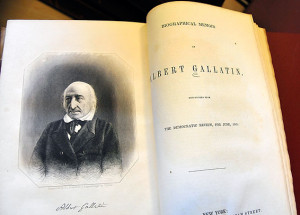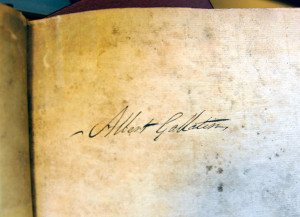 The IHR library is excited to announce that we have discovered several items in the US collections that once belonged to prominent early American statesman Albert Gallatin (1761-1849). These works came to the library as part of the Conway bequests of the 1920s and 30s and represent a selection of Gallatin’s – much larger – personal library. They provide us with an insight into the type of works owned by Gallatin and may, in at least one instance, cast light on how he acquired some of the books in his collection. Over the next two weeks the IHR and Senate House libraries will post a series of blog entries celebrating items in our collections relating to Gallatin’s political career. This post will look at Gallatin’s life and the significant role he played in the political and economic debates of the United States during the Antebellum period. It will also briefly introduce one of the sources recently uncovered that bears marks of ownership linking it to Gallatin.
The IHR library is excited to announce that we have discovered several items in the US collections that once belonged to prominent early American statesman Albert Gallatin (1761-1849). These works came to the library as part of the Conway bequests of the 1920s and 30s and represent a selection of Gallatin’s – much larger – personal library. They provide us with an insight into the type of works owned by Gallatin and may, in at least one instance, cast light on how he acquired some of the books in his collection. Over the next two weeks the IHR and Senate House libraries will post a series of blog entries celebrating items in our collections relating to Gallatin’s political career. This post will look at Gallatin’s life and the significant role he played in the political and economic debates of the United States during the Antebellum period. It will also briefly introduce one of the sources recently uncovered that bears marks of ownership linking it to Gallatin.
Albert Gallatin and the politics of the early United States
Albert Gallatin was born into a prominent merchant family in Geneva where he spent his childhood and adolescence. Orphaned at an early age, he spent much of his youth as a student in residency at the Geneva Academy where he became enamoured with the philosophy of the French Enlightenment. His enthusiasm for French philosophers, especially Jean-Jacques Rousseau, and the magnetic draw American revolutionary ideology led the young Gallatin to consider sailing for the United States – a place where Enlightenment principles might be put into practice. In 1780, at the age of 19, Gallatin arrived in Boston. The first few years of his life in America were spent in Massachusetts and Maine. Enticed by the prospect of organizing a new community of French refugees, he later headed south and settled in western Pennsylvania. It was in Pennsylvania that he first became embroiled in the fractious politics of the new nation. In 1790 he won a seat in the state senate before becoming a US senator for Pennsylvania in 1793. In the Federal Senate, Gallatin aligned himself with the Jeffersonian Republicans in opposition to the financial policies of the first Secretary of the Treasury Alexander Hamilton and, as a result, soon fell out of favour with the Federalist majority in the chamber. He became an early causality of the Federalist campaign to marginalize foreign-born Republican supporters (culminating in the passing of the Alien and Sedition Acts in 1798) after his congressional opponents eventually managed to unseat him on the basis that he did not meet the residency requirements to qualify for admission into the Senate. He was later elected to the House of Representatives for Pennsylvania’s 12th district, an office he occupied from 1795 to 1801. Gallatin was instrumental in negotiating the peaceful resolution of the Whiskey Rebellion, a protest movement in western Pennsylvania spurred by Hamilton’s tax on distilled liquor. Though he abhorred the secessionist rhetoric and violent tactics of many of the rebels, he sympathized with their core position regarding federal tax policy. As a resident of the western counties with a track record of opposition to the Federalist bloc in congress, Gallatin was able to earn the trust of many of the movement’s leaders and helped to convince them to stand down before the arrival of Federal troops.
He became the Republican party leader in the House and was a leading critic of the Adams administration and the national debt. Following the spectacular electoral victory of Thomas Jefferson and his Republican allies in 1800 (the so-called ‘Revolution of 1800’) Gallatin was appointed the fourth Secretary of the Treasury. He stayed in this office during the Jefferson and Madison administrations, leaving office in 1813/14. Though he had initially opposed Hamilton’s plans for a national bank, the need to adequately fund the army during the War of 1812 convinced Gallatin of its necessity. Accordingly, he departed from the position held by many in his party and helped charter the Second Bank of the United States in 1816. He then spent most of the subsequent decade abroad, first as the US Minister to France (1816-1823) and then to Britain (1826-27). Upon returning to the United States, Gallatin settled in Astoria, New York, where he spent the last twenty years of his life.
Throughout his career Gallatin pursued projects to promote learning and the Arts in his adopted country. He first developed an interest in the ecology and geography of North America as well as Native American culture while studying at the Geneva Academy. He maintained an interest in these subjects throughout his career in the United States. In 1803 and 1804, he helped plan the Lewis and Clark expedition to the lands acquired by the United States as a result of the Louisiana Purchase. During his New York years, after he had retired from political office, Gallatin became involved in several civic and national improvement campaigns. In 1831 he backed efforts to found a university for New York’s growing commercial classes. The result was the establishment of New York University. Gallatin also became the President of the American Ethnological and New York Historical Societies. He published two works on Native American culture: A Table of Indian Languages of the United States (1826) and Synopsis of the Indian Tribes of North America (New York, 1836). Finally, he continued to write pamphlets and deliver speeches on national economic and political issues, many of them having to do with the western expansion of the United States (for example, he published a pamphlet on the peace with Mexico in 1848).
For more information on the life and works of Albert Gallatin, consult the following works in the IHR and Senate House libraries:
The IHR:
- The correspondence of John Badollet and Albert Gallatin, 1804-1836, edited by Gayle Thornbrough (Indianapolis, 1963).
- Henry Adams, The life of Albert Gallatin (Philadelphia, 1880).
- Henry Adams, The Writings of Albert Gallatin, 3 vols (Philadelphia, 1879).
Senate House Library:
- Alexander Balinky, Albert Gallatin: fiscal theories and policies (New Brunswick NJ, 1958).
- Walter Raymond, Albert Gallatin: Jeffersonian financier and diplomat (New York, 1957).
- J.A. Stevens, Albert Gallatin (1884).
The Laws of the Commonwealth of Pennsylvania (Philadelphia, 1793)

Gallatin’s signature on the front flyleaf of ‘The Laws of the Commonwealth of Pennsylvania’ (Philadelphia, 1793).
The IHR library holds many items containing provenance suggesting that they were owned by Albert Gallatin. The majority of these items are presentation copies of pamphlets and books bearing manuscript inscriptions and messages directed to Gallatin (we will be looking at a few of these items in future blog posts). Within one volume, however, we discovered direct evidence that established that the item was once owned by Albert Gallatin. In this case the provenance was very clear: Gallatin’s signature on the front flyleaf of the 2nd volume of a 1793 edition of The Laws of the Commonwealth of Pennsylvania. The Laws was printed in Philadelphia while Gallatin was serving his short term in the Senate as a representative for Pennsylvania. In our next blog we will examine in detail a collection of pamphlets held in the IHR collection, once owned by Gallatin, that focuses on an issue that remained close to his heart during his career in America: the Northeastern Boundary Dispute (1783-1842).
